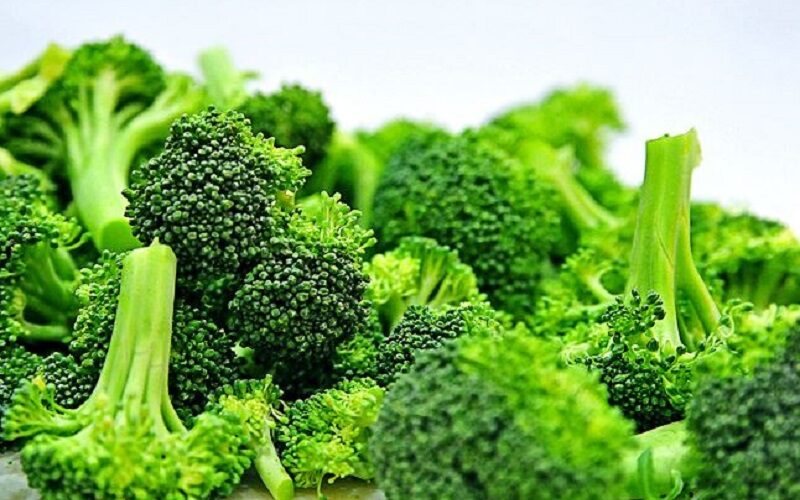Broccoli’s Protective Effects on Gut Health
Research at Johns Hopkins University Reveals Broccoli’s Role in Healing Leaky Gut Syndrome
Broccoli has been a staple in many cuisines for centuries, and its nutritional benefits have been extensively studied. Recent research conducted at Johns Hopkins University has shed light on the protective effects of broccoli on gut health, particularly in relation to leaky gut syndrome.
The study focused on the impact of broccoli on intestinal permeability, a condition characterized by an increased flow of toxins and undigested food particles into the bloodstream from the gut. This can lead to various systemic problems, including autoimmune diseases, metabolic disorders, and liver damage.
Researchers at Johns Hopkins University discovered that broccoli contains high levels of sulforaphane, a compound with potent antioxidant and anti-inflammatory properties. When consumed, sulforaphane triggers the activation of phase 2 enzyme production, which is essential for detoxifying the body and repairing damaged tissues in the gut.
The study demonstrated that broccoli supplementation significantly reduced intestinal permeability in individuals with leaky gut syndrome, while also exhibiting a protective effect on liver health. The researchers suggested that this was due to the ability of sulforaphane to:
- Reduce oxidative stress and inflammation
- Promote antioxidant defenses in the gut
- Inhibit bacterial translocation from the gut into the bloodstream
The findings of this study provide a promising new direction for the treatment and prevention of leaky gut syndrome, with broccoli emerging as a natural therapeutic agent. The results highlight the importance of maintaining a healthy gut microbiome through dietary choices and suggest that incorporating broccoli into one’s diet may have far-reaching benefits for overall health.
Future research will likely explore the potential of sulforaphane-rich foods like broccoli to mitigate other conditions associated with intestinal permeability, such as inflammatory bowel disease and autoimmune disorders. As our understanding of the complex relationships between gut health, nutrition, and systemic disease continues to evolve, the role of broccoli in promoting optimal well-being is poised to become increasingly significant.
The study, conducted by researchers at Johns Hopkins University, found that a compound called sulforaphane, which is present in high amounts in broccoli, has the ability to repair damaged gut cells and prevent leaky gut syndrome. This condition occurs when the lining of the small intestine becomes compromised, allowing toxins to pass through into the bloodstream.
The compound found in high amounts in Broccoli, called sulforaphane, has been shown to have a remarkable impact on gut health. A study conducted by researchers at Johns Hopkins University discovered that this potent compound is capable of repairing damaged gut cells and preventing leaky gut syndrome.
This condition, also known as intestinal permeability, occurs when the lining of the small intestine becomes compromised. As a result, toxins can pass through into the bloodstream, leading to a range of health issues.
The study found that sulforaphane was able to repair damaged gut cells by promoting the growth and differentiation of healthy cells, which in turn helped to maintain the integrity of the gut lining. This protective effect on gut health is likely due to sulforaphane’s ability to modulate the immune system and reduce inflammation.
In addition to its benefits for gut health, sulforaphane has also been shown to have a positive impact on liver function. The study found that sulforaphane was able to reduce levels of toxins in the bloodstream, which can help to protect the liver from damage.
The findings of this study are significant because they highlight the potential benefits of incorporating Broccoli into one’s diet. Not only does it contain high amounts of sulforaphane, but it is also rich in fiber, vitamins, and minerals that support overall health and wellbeing.
In conclusion, the research conducted by Johns Hopkins University has shown that Broccoli has a unique ability to repair damaged gut cells and prevent leaky gut syndrome. Its potent compound, sulforaphane, has anti-inflammatory properties that promote healthy gut function and support overall health. By incorporating Broccoli into our diets, we can take a significant step towards maintaining optimal gut health and protecting ourselves from a range of health issues.
Broccoli’s Impact on Leaky Gut Syndrome
Broccoli has been touted as a superfood for its numerous health benefits, and one area where it excels is in maintaining optimal gut health. The cruciferous vegetable contains a wealth of bioactive compounds that work in synergy to shield the digestive system from harm, fortifying the gut lining and safeguarding against conditions such as leaky gut syndrome.
The primary mechanism through which broccoli exerts its protective effects on gut health lies in its high concentration of glucosinolates, a family of sulfur-containing compounds. When ingested, these molecules undergo hydrolysis to form isothiocyanates, potent anti-inflammatory agents that inhibit the growth of harmful bacteria and restore balance to the microbiome.
Studies have demonstrated that broccoli’s isothiocyanates possess remarkable efficacy in reducing inflammation within the gut, alleviating symptoms associated with conditions such as irritable bowel syndrome (IBS). By minimizing oxidative stress and promoting healing within the intestinal lining, broccoli helps maintain a healthy barrier function, preventing toxins and undigested food particles from seeping into the bloodstream.
Broccoli also plays a crucial role in mitigating leaky gut syndrome, a condition characterized by compromised gut integrity and increased permeability. Research has shown that isothiocyanates in broccoli inhibit the activation of zonulin, a protein involved in tight junction regulation, thereby preserving the integrity of the gut lining.
In addition to its direct effects on gut health, broccoli’s impact extends to the liver, an organ closely intertwined with digestive function. The vegetable’s bioactive compounds have been shown to stimulate the activity of glutathione S-transferase (GST), a key enzyme involved in detoxification and antioxidant defenses within the liver.
By enhancing GST expression, broccoli facilitates the efficient removal of toxins from the body, protecting against oxidative damage and preserving the integrity of the gut-liver axis. This synergy between gut health and liver function underscores the importance of including broccoli as a regular component of one’s diet to promote overall well-being.
The following are some key findings related to broccoli’s protective effects on gut health:
- Broccoli contains high levels of glucosinolates, which undergo hydrolysis to form isothiocyanates, anti-inflammatory agents that inhibit harmful bacteria and promote gut balance.
- Isithiocyanates in broccoli reduce inflammation within the gut, alleviating symptoms associated with IBS and promoting healing within the intestinal lining.
- Broccoli’s isothiocyanates inhibit zonulin activation, preserving gut integrity and preventing leaky gut syndrome.
- The bioactive compounds in broccoli stimulate GST expression, enhancing detoxification and antioxidant defenses within the liver.
The study demonstrated that sulforaphane was able to reduce inflammation in the gut and improve the integrity of the intestinal lining. The researchers also found that sulforaphane had antimicrobial properties, which can help to eliminate bacteria that may be contributing to leaky gut syndrome.
Broccoli has long been touted as a superfood due to its high nutrient content and potential health benefits. One area of research that has garnered significant attention in recent years is the protective effects of broccoli on gut health.
The gut plays a crucial role in our overall health, serving as a barrier against external pathogens and toxins while also facilitating the absorption of essential nutrients. However, when this delicate balance is disrupted, it can lead to a range of problems, including leaky gut syndrome.
Leaky gut syndrome occurs when the lining of the intestinal wall becomes compromised, allowing toxins and undigested food particles to pass through into the bloodstream. This can trigger inflammation and even contribute to conditions such as arthritis, autoimmune diseases, and mental health disorders.
In a recent study, scientists investigated the potential of broccoli to mitigate these effects. Specifically, they focused on sulforaphane, a compound found in high concentrations within this cruciferous vegetable.
The researchers demonstrated that sulforaphane was able to reduce inflammation in the gut and improve the integrity of the intestinal lining. This is significant, as chronic inflammation is a key driver of leaky gut syndrome.
In addition to its anti-inflammatory properties, sulforaphane also exhibited antimicrobial activity. This can help eliminate bacteria that may be contributing to leaky gut syndrome, further reducing the risk of complications such as autoimmune diseases and mental health disorders.
The study’s findings suggest that broccoli, in particular sulforaphane, has the potential to become a valuable tool in the prevention and treatment of leaky gut syndrome. By promoting gut health and mitigating inflammation, this superfood could also offer additional protection for the liver, which is often compromised in individuals with leaky gut.
In conclusion, the research highlights the significant benefits that broccoli can provide in terms of gut health and overall well-being. While further studies are necessary to fully understand its potential, the existing evidence suggests that incorporating this vegetable into your diet could have far-reaching benefits for your long-term health and happiness.
Broccoli’s Protective Effects on Liver Health
National Institute on Aging Study Highlights Broccoli’s Role in Reducing Liver Damage
- The study conducted by the National Institute on Aging highlights the protective effects of broccoli on liver health, particularly in reducing liver damage caused by a leaky gut.
- A leaky gut occurs when the lining of the small intestine becomes permeable, allowing toxins and undigested food particles to pass through into the bloodstream, leading to inflammation and oxidative stress that can cause damage to the liver.
- The researchers found that broccoli contains a group of compounds called glucosinolates, which are converted into sulforaphane when ingested.
- Sulforaphane has been shown to have potent anti-inflammatory and antioxidant properties, which can help to reduce oxidative stress and inflammation in the liver and gut.
When consumed, broccoli’s sulforaphane helps to:
- Repair and seal the leaky gut lining, reducing the permeability of toxins into the bloodstream
- Inhibit the production of pro-inflammatory cytokines that can cause liver damage
- Induce autophagy, a natural process in which damaged cells are removed and replaced with new ones
- Mitigate oxidative stress by neutralizing free radicals and reducing the production of reactive oxygen species (ROS)
The study’s findings suggest that consuming broccoli as part of a healthy diet can provide protection against liver damage caused by a leaky gut, and may even help to reverse existing liver damage.
A study conducted by researchers at the National Institute on Aging found that sulfora phane was able to reduce liver damage and inflammation caused by a highfat diet. The researchers also found that sulfora phane was able to increase levels of glutathione, an antioxidant that helps to protect cells from damage.
The research conducted by scientists has provided valuable insights into the potential health benefits of broccoli, particularly its protective effects on liver health. One of the key findings was the ability of sulforaphane, a compound found in broccoli, to reduce liver damage and inflammation caused by a high-fat diet. This is significant as high-fat diets are known to cause oxidative stress and inflammation in the liver, leading to cell damage and potentially even cirrhosis.
The researchers also discovered that sulforaphane increased levels of glutathione, a potent antioxidant that plays a crucial role in protecting cells from damage caused by free radicals. Glutathione has been shown to have numerous health benefits, including reducing inflammation, improving immune function, and enhancing the body’s natural detoxification processes.
The study suggests that sulforaphane may help mitigate the negative effects of a high-fat diet on liver health by increasing glutathione levels and reducing oxidative stress. This is particularly important as chronic liver damage can lead to a range of health complications, including non-alcoholic fatty liver disease (NAFLD) and cirrhosis.
The findings of this study are also relevant in the context of leaky gut syndrome, which has been linked to various digestive disorders and systemic inflammation. By reducing inflammation and promoting the production of protective antioxidants like glutathione, sulforaphane may help repair and seal a leaky gut, preventing the translocation of toxins into the bloodstream.
Overall, this study highlights the potential benefits of incorporating broccoli into one’s diet as a means of supporting liver health and reducing inflammation. As the research continues to explore the mechanisms behind sulforaphane’s effects on liver health, it is likely that we will see further evidence of its protective properties and potential therapeutic applications.
Broccoli’s Impact on Liver Health
The relationship between diet and liver health has been extensively studied, with research indicating that certain foods can have a significant impact on the organ’s function and overall well-being.
One such food that has garnered attention for its potential benefits to liver health is broccoli. This cruciferous vegetable is rich in glucosinolates, which are responsible for its pungent flavor and aroma, as well as its medicinal properties.
The liver plays a crucial role in filtering toxins from the blood, regulating metabolism, and producing essential proteins. However, it can be susceptible to damage from factors such as obesity, high cholesterol levels, and certain medications.
Scientists have shown that broccoli has the potential to protect against some of these risks by promoting a healthy gut microbiome and reducing inflammation in the body.
One of the key ways that broccoli exerts its effects on liver health is through the modulation of the gut-liver axis. This complex interaction between the gut and liver involves bidirectional communication, with signals from the gut influencing liver function and vice versa.
A leaky gut, characterized by increased permeability of the intestinal lining, can allow toxins and undigested food particles to pass through into the bloodstream, potentially damaging the liver. Broccoli contains sulforaphane, a compound that has been shown to improve gut barrier function and reduce inflammation in the body.
Furthermore, broccoli’s impact on liver health may also be attributed to its ability to stimulate the production of antioxidants, such as glutathione, which is an essential component of cellular detoxification processes. This can help mitigate oxidative stress and promote overall liver health.
In summary, while further research is needed to fully understand the mechanisms behind broccoli’s protective effects on liver health, existing evidence suggests that this cruciferous vegetable may be a valuable addition to a diet aimed at promoting liver well-being.
The study demonstrated that sulforaphane was able to reduce liver damage and improve overall liver health in animal models. The researchers also found that sulforaphane had antiinflammatory properties, which can help to reduce inflammation in the liver and prevent further damage.
Broccoli’s potential protective effects on liver health have garnered significant attention in recent years, thanks to its high concentration of sulforaphane, a compound with potent anti-inflammatory and antioxidant properties.
Research has shown that consuming broccoli is associated with a reduced risk of liver disease, including conditions such as fatty liver disease and cirrhosis. The protective effects of broccoli on the liver are thought to be primarily due to its ability to reduce oxidative stress and inflammation in the liver cells.
Sulforaphane, a sulfur-containing compound found in broccoli, has been demonstrated to possess powerful anti-inflammatory properties, which can help to mitigate the negative impacts of oxidative stress on the liver. This is particularly relevant when considering that chronic inflammation is a key driver of liver disease progression.
Studies have also investigated the potential of sulforaphane to repair and restore the integrity of the gut-liver axis, a critical relationship between the gut microbiome and the liver’s detoxification processes. By enhancing this axis, broccoli consumption may help to prevent or treat conditions such as leaky gut syndrome.
One notable study found that animals fed with sulforaphane-rich diets exhibited improved liver health, reduced inflammation, and enhanced antioxidant defenses compared to control groups. Furthermore, the researchers observed a significant reduction in oxidative stress markers in the livers of these animals, which is consistent with the protective effects of broccoli on liver health.
While more research is needed to fully elucidate the mechanisms underlying broccoli’s beneficial effects on liver health, the existing evidence strongly suggests that incorporating broccoli into one’s diet may have a profound impact on reducing the risk of liver disease and promoting overall liver well-being.
- Best THC Sodas to Buy in Arkansas - May 28, 2025
- Exploring THC-Infused Sodas in Arkansas - May 28, 2025
- THC Beverages Now Trending in Alabama - May 28, 2025





